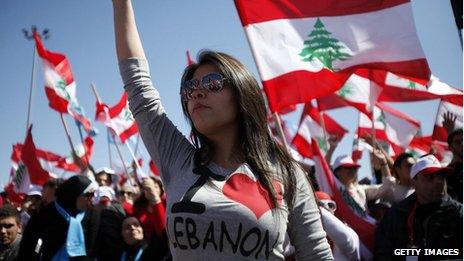Fading optimism of the Arab Spring
- Published

Twenty years since Beirut stopped being the Middle East's most war-torn city, recent tensions elsewhere have left many citizens deeply uncomfortable.
In Beirut, the jacaranda trees are in blossom, their perfumed purple flowers swaying in the breeze off the Mediterranean.
It should be a perfect time. They are having a long weekend to celebrate the 12th anniversary of Israel's withdrawal from the zone it occupied in the south.
It is early summer, and for the secular Lebanese that means the beach, the pool and the worship of the god of the suntan. My hotel used to be pleasantly scruffy, with an old fashioned oblong pool that was excellent for doing lengths.
It has been renovated, and now the pool has been turned into a place to pose, with a swim-in bar where you can wallow to check out whichever sex you find most interesting, or to do a watery dance to the music pumping out of the speakers.
Surgeons and silicone, not nature, shape some of the flesh on display. It is trendy and one of the places to go in a city where, for some people with a bit of money, image matters more than almost anything else.
For those who do not want to lose themselves in Beirut's hedonism, or cannot afford to, identity generally matters a lot more than the show.
Lebanon is a patchwork of 18 officially recognised sects, and this last week the fault lines between them have been flexing in a way that makes the Lebanese, with their history of civil war, feel deeply uncomfortable.
Hanging out at the pool might help the fortunate few put it out of their minds, but not far away people have died violently in sectarian incidents that bring back bad memories.
It is 20 years since Beirut stopped being the Middle East's most war-torn city.
In many ways it is a huge success story. But those difficult sectarian fault lines will not go away, and it is next door to Syria, which is sinking fast into its own civil war.
Lebanon and Syria have deep, complex connections, and it was always a matter of time before the tension and violence leaked over the border in this direction.
The challenge now is for the leaders of Lebanon's jumpy communities to stop it getting worse.
I have come to Beirut from Cairo, where they were having a proper presidential election, the kind where the voters do not know the outcome in advance.
One evening this week in Cairo I was in the gym on the running machine, watching the news on al-Arabiya, one of the Arabic satellite channels.
It struck me as I puffed along that the message coming from the big screen had none of the optimism that would have been there last spring.
The process of change, the emergence of a new Middle East, has turned out to be long and hard.
A year ago it was possible to hope that the violence that was already happening was temporary.
Libya's civil war is over, but Syria's killing now looks much more like part of the landscape. And the Lebanese are getting very nervous
The bulletin I was watching led with the suicide bombing in Yemen that killed 96 soldiers.
The pictures showed hundreds of uniformed men surging away from the site of the explosion, where scores of unmoving bodies were piled up together.
I know that particular place in Sanaa, the Yemeni capital. It is a wide, straight parade ground that is used as part of a highway most of the time.
The aggressive and ambitious local affiliate of al-Qaeda said they did it. They are the same people who have got worryingly close to blowing up airliners with bombs hidden in underwear.
The attack in Sanaa, well away from al-Qaeda's strongholds in Yemen, is a heavy blow for the new government.
And so the Arabiya news went on. Families weeping over the shrouded bodies of dead children. Graphics framed by barbed wire.
Not everything was unrelentingly terrible. In Baghdad, negotiations between Iran and the world's big powers about its nuclear programme might eventually lead to a deal that takes some of the steam out of what could become a global crisis.
And of course the Egyptians are having their presidential election, not perfect democracy yet but going in the right direction.
It seems to have re-energised Egyptians who were getting very pessimistic about the future.
Their country still has huge problems, but they have had a reminder this week that their country was really changed by the revolution.
For a short time last year it looked as if the drama in the Middle East might be over by the summer. The dominoes seemed to be tumbling, like they did in Europe in 1989.
Irreversible change is happening. But it is clear now that the way ahead is long and hard, and it will be years, not months, before the Arabs and their neighbours get to the end of it.
How to listen to From Our Own Correspondent:
BBC Radio 4: A 30-minute programme on Saturdays, 11:30 BST.
Second 30-minute programme on Thursdays, 11:00 BST (some weeks only).
BBC World Service:
Hear daily 10-minute editions Monday to Friday, repeated through the day, also available to listen online.
Read more or explore the archive at the programme website.
- Published25 April 2018
- Published21 May 2012
- Published21 May 2012